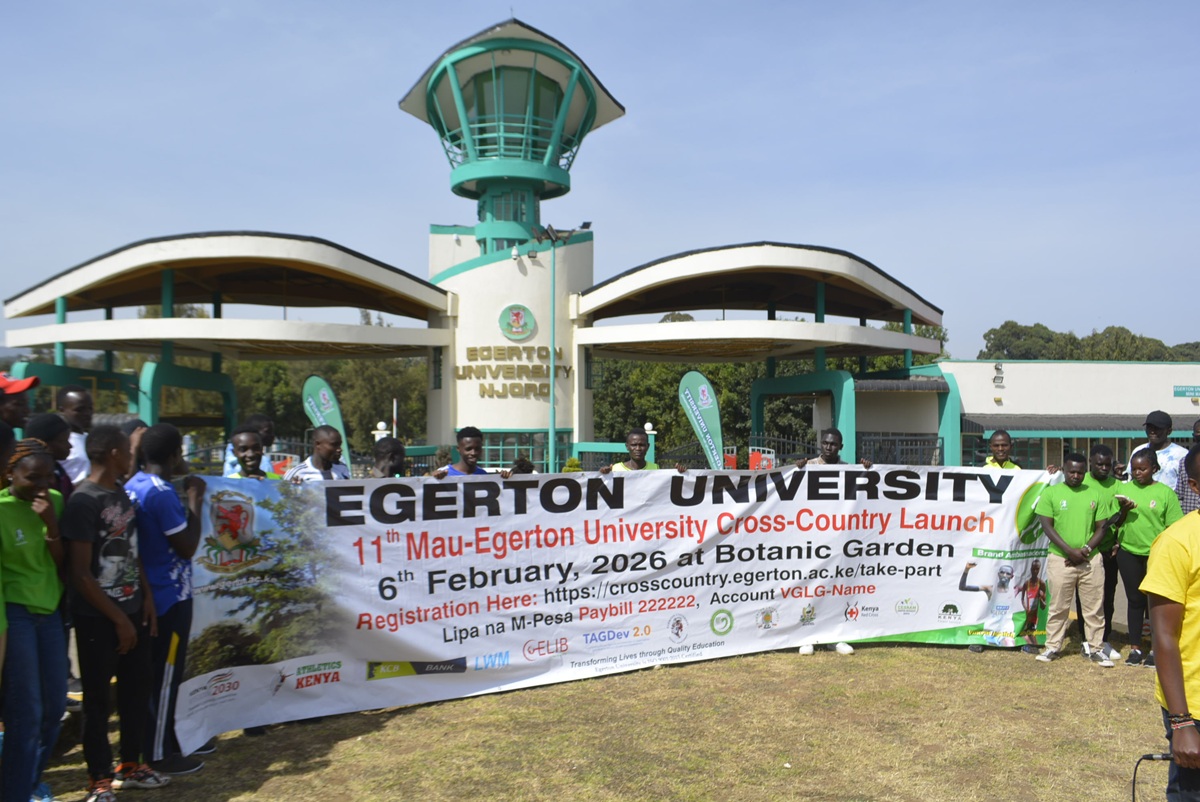Egerton University held its Faculty of Law National Legal Aid Conference this week, officially opened by the Vice Chancellor, Prof. Isaac Kibwage. The conference brought together legal experts, environmental advocates, and government officials to address the emerging challenges posed by climate change and its impact on justice systems in Kenya.
Honorable Alfred Angote, Principal Judge of the Environment and Lands Court, highlights the court's role in enforcing climate-related laws and addressing the challenges faced by vulnerable communities impacted by climate change at the conference. Date: October 23, 2024. Photo Credit: Kurian Musa/Egerton University.
Among the key speakers was former Chief Registrar of the Supreme Court, Anne Amadi, who acknowledged that this was not her first time attending the Faculty of Law conference. She emphasized the need for robust legal strategies to manage human-induced climate change conflicts, particularly in areas like Baringo County, which has experienced severe environmental changes. "We look forward to gaining insights from this conference to develop strategies to address climate change conflicts and litigations," she said. Amadi further noted that under Article 27 of the Constitution, citizens are empowered to challenge issues that threaten the environment and seek redress through the courts.
Amadi also shed light on recent evictions and demolitions in Nairobi's informal settlements, particularly structures built on riparian land, due to environmental changes and flooding. "When the flooding occurred in Nairobi, people were given only 48 hours to vacate," she observed, raising concerns about the role of local chiefs and sub-chiefs in allocating land in riparian areas. These figures, she argued, often escape accountability when disasters strike.

Prof. Patricia Kameri Mbote, Director of UNEP's Law Division, discusses key findings from UNEP's 2024 Foresight Report, focusing on global shifts and the urgent need for legal frameworks to tackle climate inequality at the conference held at Simba Lodge, Naivasha. Date: October 23, 2024. Photo Credit: Kurian Musa/Egerton University.
Honorable Alfred Angote, Principal Judge of the Environment and Lands Court, was a notable guest at the conference. He recognized the contributions of Egerton University and its leadership, including Prof. Kibwage and Dr. Ruth Aura, Dean of the Faculty of Law, in hosting such an impactful event.
Judge Angote reflected on the critical role of the Environment and Lands Court, which was established following the promulgation of the 2010 Constitution. With 52 judges now serving in the court, the judiciary has made significant strides in handling land and environmental cases. "We owe gratitude to figures like former Chief Registrar Anne Amadi and Prof. Patricia Mbote, who have been instrumental in the growth of this court," Angote remarked.
Addressing climate justice, Judge Angote highlighted the escalating problems faced by vulnerable communities due to climate change. He referenced the Ilchamus and Tugen communities in Baringo, whose livelihoods have been disrupted by rising water levels in Lake Bogoria. "Climate change issues are not only acts of nature but also man-made," he stated, emphasizing the need for compensation when government adaptation strategies fall short.
Judge Angote also discussed the court's responsibility in shaping policies and holding the government accountable for its international commitments, such as the Paris Agreement. "The courts ensure that climate-related litigations are heard, providing a forum for the public to ventilate their concerns about how climate change affects them," he added.
One of the pressing issues raised during the conference was the use of riparian land. Judge Angote noted the delicate balance between sustainable land use and development. "Why does the court stop the demolitions of structures on riparian lands while environmental actors question why developers are encroaching on these areas?" he asked, stressing the importance of public participation in land conservation policies.

Anne Amadi, former Chief Registrar of the Supreme Court, shares her insights on the need for legal strategies to combat climate change conflicts in Baringo County during the Faculty of Law National Legal Aid Conference at Simba Lodge, Naivasha. Date: October 23, 2024. Photo Credit: Kurian Musa/Egerton University.
Logging in forest areas was another area of concern, with discussions focusing on the need for inclusive approaches to forest conservation while recognizing logging as an economic activity. "Courts are stewards of the environment, and we are committed to conserving the ecological balance," Judge Angote concluded, underscoring the role of courts in enforcing Environmental Impact Assessments (EIA) for projects and regulating emissions.
Senior Counsel Prof. Patricia Kameri Mbote, Director of UNEP's Law Division, delivered remarks on UNEP's 2024 Foresight Report, which highlights critical global shifts, including persistent and widening inequalities. She emphasized the role of legal systems in addressing the disproportionate impact of climate change on vulnerable populations.
As the conference progressed, attendees expressed optimism that the discussions and outcomes would lead to meaningful legal and policy interventions, both nationally and internationally, to combat climate change and promote environmental justice.
By Kurian Musa
Communications Officer,
Directorate of Marketing and Resource Mobilization,
Egerton University








